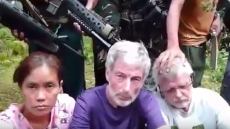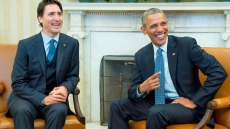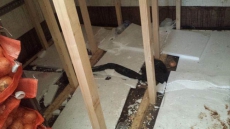MANILA, Philippines — Enraged by the beheading of a second Canadian hostage by ransom-seeking Abu Sayyaf extremists, Philippine troops pressed a major offensive in the south Tuesday but there was no sign of an end to the small but brutal insurgency that a new president will inherit in about two weeks.
With a black Islamic State group-style flag as a backdrop, Abu Sayyaf fighters beheaded Canadian hostage Robert Hall on southern Jolo island on Monday after a ransom deadline passed.
Prime Minister Justin Trudeau and his Philippine counterpart, Benigno Aquino III, expressed outrage and vowed to exact justice.
Another Canadian, former mining executive John Ridsdel, was beheaded by the militants in April. The fate of two other hostages from Norway and the Philippines who were abducted with Hall and Ridsdel from a small marina on southern Samal Island in September remains unknown, according to the military.
"This latest heinous crime serves to strengthen our government's resolve to put an end to this reign of terror and banditry," Aquino said through his spokesman.
In Ottawa, Trudeau said his government is "more committed than ever to working with the government of the Philippines and international partners to pursue those responsible for these heinous acts and bring them to justice, however long it takes."
RCMP Commissioner Bob Paulson said the Mounties are helping local authorities give chase to the kidnappers, "but as you know, it's a very difficult piece of geography and it's a very complex and challenging environment."
The RCMP is conducting an extraterritorial investigation into the murders, meaning the perpetrators could one day face justice in Canada, he added.

Hall was born in Calgary, but lived in various places in Western Canada, and his career path took him from insurance sales to welding to acting, the Globe and Mail reported after he was taken hostage last September.
Monday's beheading is the latest tragedy in the volatile mix of poverty, firearms, neglect and lawlessness that has cursed the southern Philippines.
The resource-rich region, where foreign and domestic mining, pineapple and banana companies have made fortunes, has been engulfed by Muslim and Marxist insurgencies.
The Abu Sayyaf emerged in the early 1990s as an extremist offshoot of a decades-long Muslim separatist rebellion waged by a large group named the Moro National Liberation Front. But the nascent Abu Sayyaf lost its commanders early in combat, sending its mostly rural fighters on a violent path of criminality, banditry and terrorism.
The group currently has about 400 fighters split into at least four factions.
Aside from support from an informal network of armed groups, the Abu Sayyaf also finds a lifeline among relatives and friends in rural communities who shelter them and provide food, logistics and information when they are pressed by army offensives.
Some local officials have also been suspected of providing support, regional military spokesman Maj. Filemon Tan said, explaining why the militants have endured in the mountainous hinterlands despite on-and-off military offensives against them.
"There are an extraordinarily large number of troops now trying to find the Abu Sayyaf on Jolo island," Tan said. "The problem really is how to locate them."
Early last year, a U.S. military force ended more than a decade of non-combat counterterrorism support, including satellite and drone surveillance, for Filipino troops battling the Abu Sayyaf, as the militants' zeal waned.
The underfunded military, one of Asia's most ill-equipped, began focusing instead on external defence as territorial rifts with China in the South China Sea escalated.
Under the new circumstances, the Abu Sayyaf sprang back into action with ransom kidnappings of tourists from neighbouring Malaysia as well as the southern Philippines, including the Samal island marina where Hall, Ridsdel, Norwegian Kjartan Sekkingstad and Filipino woman Marites Flor were taken at gunpoint last Sept. 21.

Following Ridsdel's beheading on April 25 and Canadian expressions of outrage, Aquino ordered an intensified offensive against the militants. He plans to fly to Jolo, about 960 kilometres south of Manila, this week to impart a sense of urgency in containing the Abu Sayyaf, according to two military officials who spoke on condition of anonymity because they were not authorized to talk about details of the trip with the media.
One of the officials, a general, said Aquino has made tremendous efforts to end the Abu Sayyaf's brutal presence before he steps down at the end of the month. As things stand, however, the incoming president, crime-busting Mayor Rodrigo Duterte, will have to take over the campaign to end the group's insurrection.



